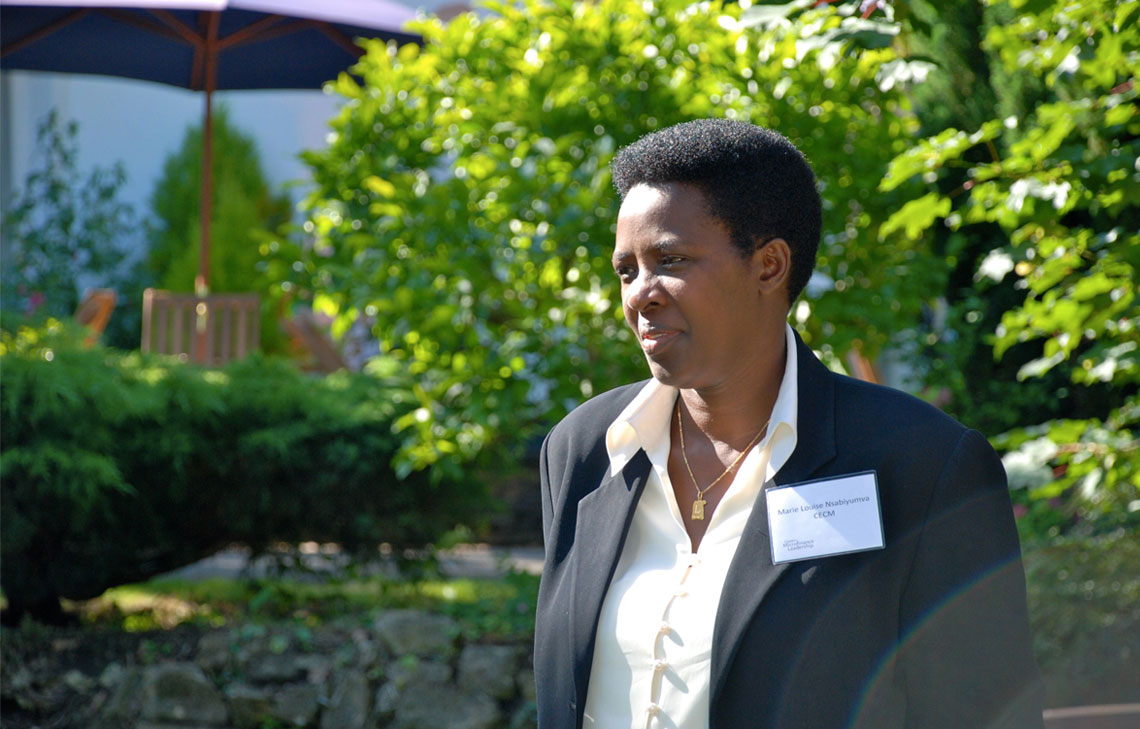Marie Louise Nsabiyumva: Delivering Financial Services to the Women of Burundi

Marie Louise Nsabiyumva realized the potential power of savings at a young age. During school breaks, she lived in rural Burundi and observed that most people had difficulties making ends meet during certain times of the year, but had abundance during others, due to agricultural cycles and weather patterns. “I realized that savings could be a good solution for this group.”
As the second of nine children, she looked after her younger brothers and sisters until she went away to boarding school. There, she blossomed and was elected to be a school delegate. She believes this early sense of responsibility had a positive impact on her professional life.
Marie Louise’s interest in women’s issues was inspired by an aunt who campaigned for women’s rights, became one of Burundi’s first female ministers and, eventually, the head of the Ministry of Social Affairs and Promotion of Women. She was inspired by her aunt’s stories about the women’s advancement. “My aunt and her team were able to achieve certain rights for Burundian women at the UN Conference on Women in Beijing,” she says.
Marie Louise became involved with microfinance while working as a local representative for a Canadian nongovernmental organization (NGO) operating in Burundi. Given a political crisis that shook the country at the time, donors willing to fund financial services for low-income women were rare, but the NGO helped to create a local savings and credit cooperative authorized to collect funds. After what she describes as “some paperwork,” Marie Louise was appointed to start the operations and Caisse Coopérative d’Epargne et de Crédit Mutuel (CECM) was born. As a women leader, Marie Louise believes she has a responsibility to voice concerns of other women. In her view, many women have good ideas but no opportunities to make them known.
At the start, CECM was known simply as the bank for women. Marie Louise clearly remembers when she saw the very first 20 women come to entrust their meager savings to CECM and when deposits at the institution reached a collective total of US $1 million.
However, during its 20 years of operation, CECM has been at the mercy of Burundi’s volatile politics. Donors were forced to suspend funding due to political disturbances before CECM began to generate revenues. Marie Louise remembers watching helplessly as political groups burned the Great Market in the capital Bujumbura while women clients burst into tears on seeing their goods destroyed.
Nonetheless, the success of small enterprises initiated by women and funded by the CECM gives her happiness and always has. Marie Louise loves accompanying a woman on the journey of starting a small shop on a table in the market and watching her business grow to a level where she has to procure stock internationally from places such as Dubai. That brings her a “joy and satisfaction” that is hard to describe.
In the two decades Marie Louise has worked in microfinance she has seen the industry evolve from focusing solely on the social mission and increasingly focusing on the financial component. Today, she believes that we are at an intelligent mix of the two. She believes that integrating the social mission into operations has had a positive impact on the financial profitability of microfinance industry. “Today you recover a loan not by badgering the debtor but by explaining the benefits of paying it back.”
“It is said that when you educate a woman, you educate a whole nation. Imagine what would happen if you give her the means to build her business.”
Lack of access to financial services in Burundi affects both genders, but it is particularly acute for women. Achieving financial inclusion will take time, but Marie Louise believes the important thing is that the community knows that building such inclusion is necessary. Marie Louise sees new tools such as mobile banking offering the possibility of both proximate services for women clients and a new opportunity for financial education. Investing in women can be a powerful force for society: “When you give these means to a woman, she first uses for the family before thinking of herself.”
Reflecting on her career, Marie Louise sees it as her duty to mentor young women and encourage them to follow in the footsteps of women leaders like herself. Her advice to the next generation is similar to her belief in the power of small loans: “Little by little, the bird builds its nest.”
For Marie Louise, if the vision of complete financial inclusion for women is achieved, the future will be bright. “It is said that when you educate a woman, you educate a whole nation,” she says. “Imagine what would happen if you give her the means to build her business.”
